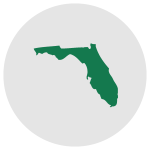Mental Health
The COVID-19 pandemic has affected the mental health of many Americans. According to a Kaiser Family Foundation poll, 53% of adults report their mental health has been negatively affected by COVID-19, and the Substance Abuse and Mental Health Services Administration received an 891% increase in calls to its “Disaster Distress Helpline.” The impacts extend to children as well. The National Child Traumatic Stress Network explains that changes of circumstances brought on by COVID-19 — such as isolation, economic hardship, unmet basic needs and greater exposure to violence and abuse at home — may result in trauma for some children.
While these changes can affect any child, transition-aged students with disabilities may be particularly at risk. A 2016 study surveyed 648 education and community professionals from 49 states. Survey participants indicated that nearly half of their transition-aged students with disabilities were experiencing some mental health concerns. While this study does not represent the full range of young adults with disabilities in the U.S., it does speak to the prevalence of mental health needs in the community.
COVID-19 may be placing additional strain and stress on students with disabilities and their families. A study from the Society for Research in Child Development’s “Child Development” journal finds that children with disabilities are psychologically vulnerable during disasters, due to “higher poverty rates, elevated risk exposure, greater vulnerability to traumatic loss or separation from caregivers, more strain on parents, and poor post-disaster outcomes.” It is therefore important that states consider the mental health needs that may arise for students with disabilities, particularly those who may have less access to school counselors, trusted adults and other mental health resources.
Many states recognize that mental health services are increasingly critical for students and young adults with disabilities. States are finding innovative ways to continue providing mental health support to students who are already receiving it and to help students cope with the additional effects of the pandemic.
Offering guidance to school mental health providers on providing tele-counseling services

The Hawaii Department of Education produced guides for school counselors to provide counseling services remotely.

The Delaware Department of Education provided schools with numerous strategies on how to continue school counseling services.

The Wisconsin Student Services Prevention and Wellness Team is holding weekly “Community of Practice” Zoom calls to guide student service professionals — including school counselors, psychologists and social workers — on supporting student mental health during school closures.
Connecting students and parents to resources and services for coping with mental health issues during COVID-19

The Hawaii Department of Education also provides informational documents containing mental health resources for children with disabilities, including multiple hotlines for parents and children and a social-emotional learning curriculum.

Colorado developed resources focused on coping mechanisms for anxiety, depression and stress for students. The resources include social-emotional learning and trauma counseling for families and schools, as well as access to 10 free mindfulness classes for children through the Mindful Schools program.

The Florida Department of Education compiled a resource to provide educators and families more information about telehealth, mental health services and youth mental health awareness training to identify students who may have serious mental health needs.
Offering direct support services to youth with mental health needs and their families

New Jersey Division of Mental Health and Addiction Services focuses on older teenagers and youth in transition, providing a helpline for emotional support during the COVID-19 pandemic. This helpline is available in English and Spanish and also in an accessible video format for the deaf. It also provides a 24/7 addiction hotline for youth and young adults with Substance Use Disorder (SUD).

The Maine branch of the National Alliance on Mental Illness (NAMI) opened an emergency enrollment process for the Respite Program due to the COVID-19 outbreak. The Respite Program offers 26 hours per month of in-home care to families of children with mental illnesses. Maine is also providing virtual phone support, child behavior management tips and education regarding a mental health diagnosis through Gaining Empowerment Allows Results (G.E.A.R).
General Resources
National Center for Systematic Improvement Library: This library hosts various behavioral and social-emotional resources. Numerous resources respond to the COVID-19 pandemic including virtual counseling and distance learning for students with severe cognitive disabilities.
Tunnels & Cliffs: A Guide for Workforce Development Practitioners and Policymakers Serving Youth with Mental Health Needs: This resource, created by the National Collaborative on Workforce and Disability for Youth (NCWD/Youth), is designed to help policymakers understand and improve service delivery systems for youth with mental health needs.
The National Child Traumatic Stress Network’s Select NCTSN Resources Related to the COVID-19 Pandemic provides a bank of resources to support the mental and emotional well-being of youth during the pandemic. The resources focus on topics like implementing trauma-informed learning environments, coping with post-disaster stress and adversity and talking to children about COVID-19.
COVID-19 Parental Resources Kit: The Resources Kit contains resources to help support parents, caregivers and other adults serving children and young people in recognizing children and young people’s social, emotional and mental health challenges and helping to ensure their well-being. Offers information and resources for specific age groups, from early childhood (0-5 years), childhood (6-12 years), adolescence (13-17 years) and young adults (18-24 years).
Support for Teens and Young Adults: CDC webpage offers information for teens and young adults to help manage stress related to COVID-19.
The Institute of Education Sciences developed a resource, Supporting Students Experiencing Trauma During the COVID-19 Pandemic.
The website of the Interagency Working Group on Youth Programs (IWGYP) contains resources to support youth and families during the COVID-19 outbreak on topics including childcare, education, employment, finances, food and nutrition, health/mental health, human services, safety and more.
Alternate View
Alaska
Well-Being Alaska
Arkansas
Coronavirus Mental Health Support
Colorado
Serious Emotional Disability, Social Emotional Learning, Mental Health & Behavior
Learning Supports for Students with Disabilities
Resources for Families of Students with Disabilities During COVID-19
Remote Learning Resources for SEL, Mental Health and Behavior
Mental Health Education Literacy Resource Bank
Behavioral Health Resources for COVID-19
Connecticut
Social Emotional Family Resources
Resources for Families
Special Education COVID-19 Resources for Families
Florida
Mental Health
COVID-19 – Mental Health
Resources for Tier II and Tier III Instruction during COVID-19
Georgia
Resiliency & Wellness: Resources for Students, Parents, and Educators during COVID-19
Georgia’s K-12 Restart Working Group: Mental Health and Wellness
Hawaii
Resources for School Counseling Programs
Special Populations Helpful Links
Idaho
COVID-19 Mental Health Support Resources
Illinois
Frequently Asked Questions for Parents of Students with Disabilities
Regarding School Year 2020-21
School Wellness: Mental Health
Indiana
COVID-19 (coronavirus) Guidance for Division of Disability and Rehabilitative Services Stakeholders
Office of Special Education COVID-19 Resources and Information
Iowa
Return-to-Learn Social-Emotional-Behavioral Health (Equity)
Learners with Special Needs Resources to Support Learning During COVID-19
Kansas
Resources for Children and Families
Navigating Change: Kansas’ Guide to Learning and School Safety Operations
Navigating Next
Mental Health Resources
Louisiana
Guide to Supporting the Well-Being of Students and Staff
Supporting Young Children Isolated Due to Coronavirus (COVID-19)
Maine
GEAR Parent Network
NAMI Maine’s Expanding Supportive Service for Special Needs Children
NAMI
Coping with Stress and Trauma
Continuity of Learning – Parent Resources
Framework for Reopening Schools and Returning to In-Person Instruction Part II: Social, Emotional, Behavioral, and Mental Health
Maryland
Mental Health, Stress, and Anxiety for Adolescents and Young Adults
Maryland Together: Maryland’s Recovery Plan for Education
Parent Resources: Tips, Straight Talk, and Guidance for Parents
Student and Young Adult Resource Guide for Coping during COVID-19
Massachusetts
Mental and Behavioral Health
DMH Child, Youth, and Family Services
Comprehensive Special Education Guidance for the 2020-21 School Year
Michigan
MDE COVID-19 Social and Emotional Learning Resources
Minnesota
2020-21 Planning Guidance for Minnesota Public Schools
Mental Health Support
Missouri
Social-Emotional Learning and Trauma-Informed Schools Initiative
Montana
OPI Special Education Trainings
Nebraska
Wellness and Mental Health
COVID-19 SEL and Mental Health Resources All Audience Resource
Nevada
Nevada’s Path Forward: A Framework for a Safe, Efficient, and Equitable Return to School Buildings
New Hampshire
New Hampshire Grades K-12 Back-to-School Guidance
Mental Health, Stress, and Anxiety Supports During COVID-19
Supporting Child and Family Wellbeing during the COVID-19 Emergency
New Jersey
The Road Back: Restart and Recovery Plan for Education
COVID-19 Consumer and Family Resources
Supporting the Emotional Well-Being of Students
New Mexico
Winter Wellness Family Resource Packet
New York
Social Emotional Learning
Resources for Mental Health and Talking to Young People about COVID-19
North Carolina
Official Lighting Our Way Forward: North Carolina’s Guidebook for Reopening Public Schools
Supplemental Optional Remote Learning Resources for Students with Disabilities
Resources Related to School Counseling During COVID-19
North Dakota
Behavioral Health Supports During COVID-19
Resource Center
Ohio
Returning to School: Supporting the Social, Emotional and Behavioral Health of Students and Staff
Coronavirus Information
Planning Guide for Ohio School Districts
Health and Well-Being
Youth & Adults Mental Health and Wellness Outreach
Oklahoma
Return to Learn Oklahoma: A Framework for Reopening Schools
Return to Learn: Social Emotional Learning Resources
Distance Learning Guidance for Special Education
Return to Learn: Launching Instruction
Coronavirus/COVID-19 Counseling Resources
Mental Health Guide for Parents and Caregivers
Mental Health Guide for Teens
Mental Health Guide for Childcare and Education
Oregon
Ensuring Equity and Access Aligning State and Federal Requirements
Five Key Ways to Support Mental Health During the COVID-19 Pandemic and Beyond
Guidance for Special Education Evaluation During COVID-19
Early Intervention/ Early Childhood Special Education
Mental Health Guidance for School Counselors, Other Mental Health Professionals and Administrators
Supporting Student and Educator Mental and Emotional Well-Being in Distance Learning
Pennsylvania
Mental Health and Well-Being Resources
Staff and Student Wellness Guide
Talking to Children About COVID-19
Puerto Rico
Plan de Contingencia y Proteccion Para Los Maestros, Asistentes, y Estudiantes de la SEcretaria Asociada de Educacion Especial Ante el COVID-19
Protocolo para la Vigilancia de COVID-19 en el sector educativo de Puerto Rico en respuesta y preparación a la apertura de escuelas
Rhode Island
Re-Opening Planning Guidance for School Counseling Programs
Tips for Coping With Stress
Mental Health Resources in Response to COVID-19
Support Services
South Carolina
COVID-19 Resources
Accelerated Task Force
South Dakota
Starting Well 2020: A Guide for Special Education
Responding to COVID
Texas
COVID-19 Mental Health Support Line
Vermont
Information for Parents and Caregivers
Virginia
Social-Emotional Wellness Considerations for Students with Disabilities
Returning to School: Planning Equity Audit
Washinton
Special Education Guidance Brief for In-Person Learning: Spring 2021
West Virginia
Special Education & Student Support Resources for Families & Educators
West Virginia Remote Learning Framework for the COVID-19 Emergency
Wisconsin
Supplemental Resources for Supporting Students with IEPs During COVID-19
A Focus on Mental Health and Wellness During School Closures
School Safety and Mental Health
Wyoming
For Parents
